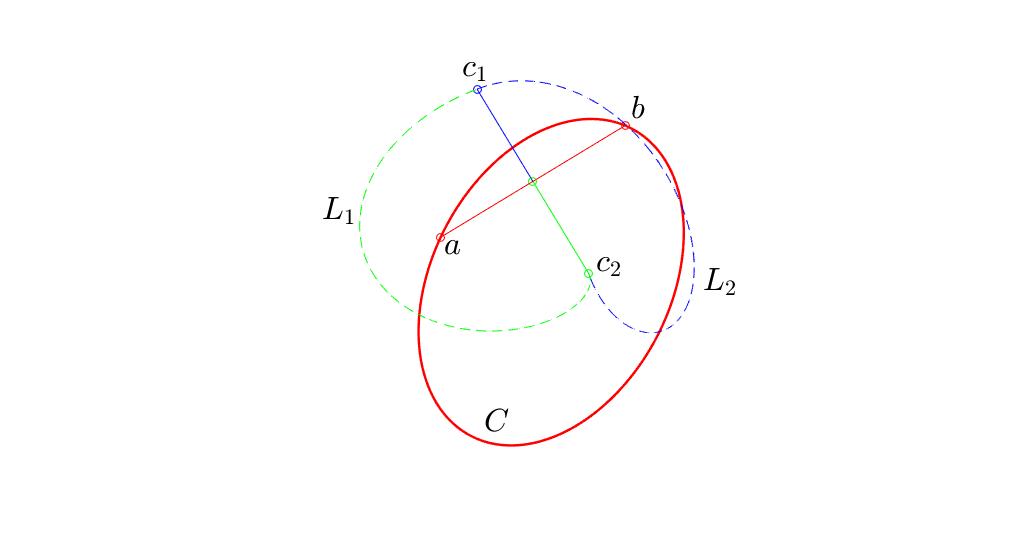This is yet another idea to to resolve this resistant problem.
Let us parametrize everything. Identify the plane containing the moving square with the complex plane $\mathbb C$ and let $\mathbb T=\{z\in\mathbb C:|z|=1\}$ be the unit circle.
Let $a(t),b(t)$, $t\in\mathbb T$, be parametrizations of the motion of the points $a,b$ such that $a(-t)=b(t)$ for every $t\in\mathbb T$.
Let $z(t)=\frac12(a(t)+b(t))$ be the parametrization of the motion of the center of the square. It follows that $z(-t)=z(t)$ is an even function.
By the assumption, the value $r(t)=|a(t)-z(t)|$ is strictly positive. So, the function $\varphi:\mathbb T\to\mathbb T$, $\varphi:t\mapsto \frac{a(t)-z(t)}{|a(t)-z(t)|}$, is well-defined and odd.
It follows that $a(t)=z(t)+r(t)\varphi(t)$ for $t\in\mathbb T$.
Then $c(t)=z(t)\pm r(t)i\varphi(t)$, $t\in\mathbb T$ is the trajectory of the motion of the vertices $c_1$ and $c_2$.
Our aim is to prove that the curves $C=a(\mathbb T)$ and $L=c(\mathbb T)$ intersect each other. To derive a contradiction, assume that they are disjoint. Replacing the functions $z(t),r(t),\varphi(t)$ by their smooth approximations, we can assume that these functions are smooth and the curve $C$ has finite intersection with each line on $\mathbb C$.
For each point $t\in\mathbb T$ consider the map $f_t:\mathbb R\to\mathbb C$ defined by $f_t(x)=z(t)+i\varphi(t)x$ and let $\Phi(t)=f_x^{-1}(C)$. Our assumption on $C$ guarantees that the set $\Phi(t)$ is finite. Moreover, since the curve connects the points $a(t)=z(t)+r(t)\varphi(t)$ and $b(t)=z(t)=r(t)\varphi(t)$ that lie on opposite sides of the line $f_t(\mathbb R)$, the set $\Phi(t)$ is non-empty. So, we get the multi-valued map $\Phi:\mathbb T\multimap\mathbb R$ with finite non-empty values. This map is odd in the sense that $\Phi(-t)=-\Phi(t)$ for every $t\in\mathbb T$.
To finish the proof it suffices to find a point $t\in\mathbb T$ such that $r(t)\in\Phi(t)$. Further I have no idea how to do that. Maybe some connectedness of mean value argument (taking into account that the function $r(t)$ is even, $\Phi(t)$ is odd, and each value $r(t)$ is contained in some $\Phi(\tau)$)?

